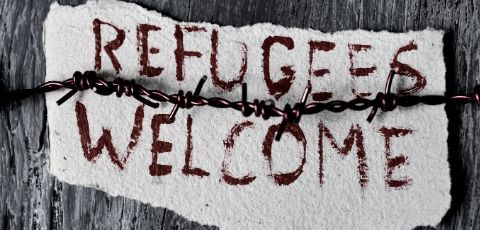Migration, asylum and refuge 2019-2020

On the occasion of World Refugee Day, we review the main activities of the FAS-UAB Refugee Reception Programme of the academic year 2019-2020
19/06/2020
The academic year 2019-2020 is coming to an end. This year has been marked by the corona virus health crisis and the increase of discrimination speeches and the visibility of racist a xenophobic violence here and across the globe, as well as the struggles and resistance of antiracist movements.
Around the 20th of June, Refugees International Day, updated data on forced displacement is made public by reference entities. These figures, each year higher, highlight a situation that has long since ceased to be a short-term phenomenon and calls for strong measures and a firm social and institutional commitment to the serious violation of the rights of migrants, refugees and displaced persons.
Since 2016, the main objective of the Welcoming Programme of the foundation Fundació Autónoma Solidària has been to contribute to the improvement of university practices in favour of the rights of persons seeking refuge.
Work is carried out in four courses of action:
- Reception: Create spaces for the inclusion of asylum seekers living in the UAB campus.
- Training: To promote access and continuity to university studies for refugee students.
- Awareness-raising: To promote critical and transformative knowledge of migration phenomena and the right of asylum.
- Networking: Generate synergies and social partners key to consolidate the role of the university as an institution committed to human rights.
This academic year, the FAS has continued to work in coordination with the Catalan Commission for Refugee Assistance (CCAR-CEAR) in order to enhance the university’s capacity to receive asylum-seekers residing in the university Vila. The declaration of the state of alarm, with the consequent confinement of the population, has led to the cessation of face-to-face activities on campus, directly affecting the implementation of the accompanying activities such as the Social Mentoring program. From the beginning of the quarantine until now, the Mentoring activities have been performed in virtual modality, with a great effort on the part of the people who make it possible: volunteer mentors from the UAB community and CCAR users.
In addition, during the academic year 2019-2020, the commitment made by the UAB regarding access for refugees at university has been given substance, understanding education as the backbone of the process of inclusion of newcomers. 16 students in refugee situations have studied, with exemption of fees, undergraduate, master’s or doctorate studies at the UAB. 10 of these people have received scholarships to support the study thanks to the microsponsorship campaign #UAB Refugi Scholarships, launched at the beginning of the year. During the sanitary confinement, 2 people from the program obtain Covid-19 Grants for the temporary release of computer equipment from the UAB, and access is managed with scholarship for 2 students from the program at the UAB Barcelona Summer School.
Regarding the aware-raising and networking courses of action, in addition to the activities of curricular advocacy, non-formal education and mobilization are carried out for the third consecutive year under the MAR Project , the Welcoming Programme has begun two courses of action that expand and reinforce the objective of promoting a critical and transformative approach to migration. On the one hand, through activities that focus on gender issues related to migration. On the other, it implements a programme in the field of Prevention of Violent Extremism (in Spanish, PEV), in collaboration with NOVACT and other Jordanian, Iraqi and Kurdish civil society organisations.
During the second semester, two virtual interuniversity courses have been carried out attended by 80 students. The first one was on prevention of violent extremisms and social polarization. The second one is on gender, migration and human rights. In addition to the entities already mentioned, we have been able to collaborate directly with organizations and reference groups such as ACATHI , Afroféminas , Sindihogar , Union of Carers without Papers , Migration, Gender and Development Network, Iridio, and UNRWA, creating spaces for encounter and discussion between the social associations and the university. The screening of the documentary, on February 19, of "Caring between lands. Who sustains life when women migrate? " , was a resounding success, surpassing the capacity of the UAB Cinema Hall. The rest of the documentaries of the Cycle of Films on Migrations and Gender had to be postponed the course 20-21 due to the cessation of activities on the Campus. With regard to training, it should be noted that the programme aims to reach out to all members of the university community, and specific asylum and refugee training has been provided for administrative and service staff of the UAB. In addition, at the end of the month, a training for university teaching staff will be organized with the Spanish committee of UNHCR: Aula Refugio, Aulas transformeas: Asilo, Interculturalidad Crítica y Antirracismo a la educación universitaria (Sheltter Classrooms, Transforming Classrooms: Sheltter, Interculturalism Critic and Antiracism at university education).
Also, an applied research on hate messages in social networks has been initiated in Catalonia, which is developed jointly with the Center for Vision by Computer of the UAB. The results of the research will allow a greater knowledge of the online dynamics and contents of hate speech, in order to be able to provide effective responses through alternative narratives and to dismantle hate speech by better identifying the target, message and channel.
The PEV programme includes four academic scholarships for the academic year 2020-2021, aimed at generating knowledge in the field of the prevention of violent extremism, peace-building, and gender studies. This call is open to women in a situation of refuge, belonging to the refugee or displaced community of Syria, Iraq or Iraqi Kurdistan, as key actors in the prevention and resolution of violent conflicts. The scholarships are financed by the ACCD and the UAB, the FAS is responsible for managing the scholarships and accompanying the selected persons during their passage to the UAB.